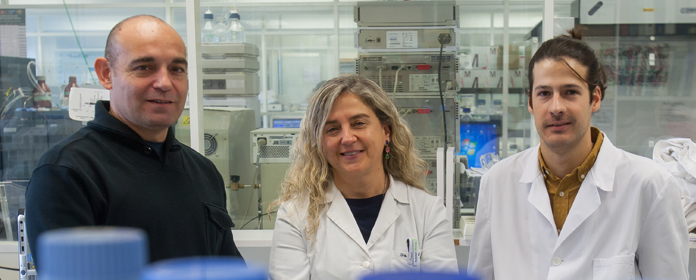The association NEN funds research of the University of Navarra on nanomedicines against childhood cancer.
The study by Carlos Rodríguez Nogales is led by Professor María Blanco Prieto together with Patrick Couvreur, a nano-oncologist at the University of Paris-Sud.

PHOTO: Manuel Castells
The association NEN -of relatives and friends of patients with neuroblastoma- has renewed the agreement that it maintains with the School of Pharmacy and Nutrition of the University of Navarra to support its research around the development of nanoparticles that improve treatments against this pediatric cancer, one of the most aggressive tumors and the most frequent in the first two years of life.
This fund - partly from the "Nico against childhood cancer" campaign of association NEN - will be used to finance the doctoral thesis of researcher Carlos Rodríguez Nogales, graduate in Pharmacy from the Complutense University of Madrid.
The main topic of the doctoral thesis that he has been carrying out for three years at the department of Technology and Chemistry Pharmaceuticals at the University of Navarra is the development of nanomedicines for the treatment of childhood cancer.
Its project is directed by María Blanco Prieto, professor of Pharmacy and Pharmaceutical Technology of the School, in partnership with Professor Patrick Couvreur, nano-oncologist and Full Professor of the School of Pharmacy of the University Paris South (France), pioneer in the development of nanomedicines.
Tailoring drugs to childhood tumorsOne of the first results of project of researcher Carlos Rodríguez has been the publication of article "Nanomedicines for pediatric cancer" in the prestigious journal ACS Nano, which belongs to the American Chemical Society. It emphasizes the importance of researchers, pediatricians, clinicians and agencies collaborating to implement nanomedicine in the treatment of pediatric cancer, something that is already being done in adult cancer.
"One of the main reasons for the introduction of nanomedicines in current pediatric protocols responds, in part, to programs of study recently conducted and which reveals that there is long-term toxicity deadline, as well as side effects, derived from chemotherapy that have been observed to develop in child cancer survivors," explains the future Doctor of Pharmacy.
In this context, nanomedicines can be expected to add a great advance, "since they improve the therapeutic index of cytostatic drugs. This translates into an increase in their efficacy and a decrease in toxicity, which is an improvement over current therapies and, as a consequence of all this, would also improve the quality of life of patients," he concludes.
The School de Farmacia and the NEN Foundation have been collaborating for more than a year now in the financing of programs of study on new drugs for the treatment of childhood cancer. This project is also supported by the association Española Contra el Cáncer (AECC).
